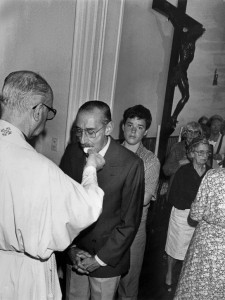 On the whole, patriotic priests are preferable to those preaching the old baloney about the universal brotherhood of man, an impossible, unnatural aspiration that, by definition, can only (if it is to mean anything) be coercive.
On the whole, patriotic priests are preferable to those preaching the old baloney about the universal brotherhood of man, an impossible, unnatural aspiration that, by definition, can only (if it is to mean anything) be coercive.
It is however better if that patriotism is clear-eyed. healthy, and not too heavily worn.
I’m not convinced that that has been the case with Jorge Mario Bergoglio, the Argentine prelate who has now become Pope Francis. Even if we disregard the rights (hard to discern) and wrongs (monumental) of the Argentine case for its unprovoked attack on the Falkland Islands in 1982, Bergoglio’s language is, well, judge for yourself.
The Daily Telegraph:
Pope Francis’s election may cause controversy in Britain over comments he made at a Mass last year for Argentine veterans of the Falklands War to mark 30th anniversary of the 1982 conflict. He reportedly said at the time: “We come to pray for those who have fallen, sons of the country who went out to defend their mother country, to reclaim that which is theirs and was usurped from them.”
Addressing relatives of fallen veterans before a visit to the Argentine military cemetery in Darwin in the Falklands in 2009, he said: “Go and kiss this land which is ours, and seems to us far away.”
He said they would not go alone, adding: “There are angels who will accompany you, who are sons, husbands and fathers of yours, who fell there, in an almost religious movement, of kissing with their blood the native soil.”
Or this, via Harry’s Place:
“Let’s pray to God that these years – despite the efforts of many to de-Malvinise history and reality – have served to silently mature the conscience of many Argentinians far and wide in this country, in a more authentic love for the Homeland, in a spirit of justice, through anonymous sacrifice, that they should be the hidden but fruitful sap which will make us live in freedom, in all the possible ways within this anxious life.”
Back in 2002 the (British Roman Catholic) Tablet provided its take on the religious dimension of the Argentine assault on the Falklands:
….Around this twentieth anniversary much has and will no doubt continue to be written. For those of us who lived the conflict at close quarters, perhaps one of the most interesting and under-reported aspects of it was the extent to which God and the Virgin Mary were used to justify the war, and to bring it to an end.
The military regime which decided to invade the islands did so in the knowledge that it counted on a powerful body of opinion within the Argentine Church to give it its blessing. The attitude of the Argentine Episcopal Conference to the regime that came to power in the 1976 coup had been equivocal. Pastoral letters had held back from public condemnation of human rights violations, and suggested that the ?common good? could be served by dealing with the moral and social disintegration that had characterised the previous civilian government of Isabelita Peron.
Only a minority of bishops, priests and nuns condemned the thousands of disappeared, and the complicity of those who pandered to national Catholicism. Those who survived the repression, like Bishop Jaime de Nevares of Neuquin, Bishop Miguel Hesayne of Viedma, and Bishop Jorge Novak of Quilmes, distanced themselves from the nationalistic fervour which surrounded the “reconquest of Las Malvinas?”.
They remained, however, in a minority. From the outset of the Falklands War, the partnership between Church and State gave the Argentine soldiers and their generals a sense of a moral crusade, and the junta the certainty of political cohesion. History was revisited and revised to provide justification for the equation between Argentine sovereignty and holy conversion.
Memories were revived of the first Spanish missionaries to the Falkland Islands, the priests portrayed as picture-book saints laying the sacramental rock on the heathen land. The subsequent British colonialism was reduced to a caricature of spiritual emptiness when, in fact, both the Anglican and Catholic faiths had retained an enduring presence on the islands. The mixing of nationalistic and religious mythology was prevalent in the first crucial hours of the Falklands conflict. On the eve of the invasion, Argentine commanders agreed that the military operation to take Las Malvinas, initially planned under the codename Azul, should be renamed Rosario, in honour of the Virgin of Rosario. According to Argentine cultural tradition, the Virgin had brought her graces to the population of Buenos Aires in the early nineteenth century before an invasion by British troops was successfully repulsed. She has been venerated passionately ever since.
On 7 April, the new Argentine military governor of Las Malvinas, General Mario Men?ndez, was sworn in during a ceremony at which Archbishop Desiderio Elso Collino, the chaplain general of the armed forces, officiated. “The gaucho Virgin is Mother of all men, but is in a very special way the Mother of all Argentines, and has come to take possession of this land, which is also her land”, stated Collino.For the rest of the war a succession of military chaplains ensured that the crusading spirit of the Argentine troops was kept alive in language reminiscent of the speeches delivered to Franco’s forces during the Spanish Civil War. In the fight against the English “heathen” no Argentine churchman was more fanatical than Fr Jorge Piccinalli….
How this all ties into Argentina’s ‘dirty war’ is, of course, something that will be worth discussing on another occasion.




